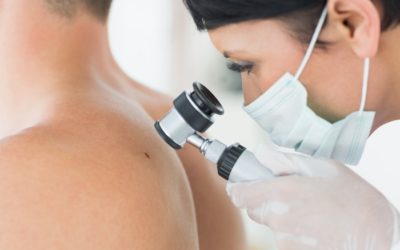The COVID-19 disease (Coronarovirus Disease 2019) is a coronavirus infection called “SARS-CoV-2”, part of the same family of viruses as six other coronaviruses known to humans for several years. COVID-19 disease can manifest itself in different ways in humans.
The most common symptoms are:
- those with an acute respiratory tract infection (sore throat, cough (especially dryness), difficulty breathing, chest pain)
- fever
- sudden loss of smell and/or taste.
Other symptoms can also appear such as:
- headaches
- general weakness, feeling unwell
- muscle pain
- a cold
- nausea, vomiting, diarrhea, abdominal pain
- skin rash
- general weakness, feeling unwell
- muscle pain
- a cold
- nausea, vomiting, diarrhea, abdominal pain
- skin rash.
The intensity of the symptoms varies. This is how some people can have only mild, very bearable symptoms when other people can end up in a critical and life-threatening situation requiring intensive care in hospital.
TREATMENT
To date, there is no specific treatment for infections caused by coronaviruses. The medical care of infected patients is limited to treatments symptomatic (cf. OFSP).
“MULTIDISCIPLINARY” REHABILITATION AFTER COVID-19
After the “storm” of the COVID-19 disease, sometimes marked by stays in intensive care (assisted ventilation, feeding by intravenous infusions etc.) comes the time of convalescence with the objectives of regaining full physical condition and autonomy in everyday life. For this, hospitalization in an establishment Specialized rehabilitation is required to regain this level of physical and mental condition.
An important point in the care of “post COVID-19” patients lies in the need for an integrating multidisciplinary therapy program, physiotherapy, occupational therapy, neuropsychological, logopedic and dietetic monitoring.
The therapeutic objectives are defined by a multidisciplinary team composed of specialist physicians, physiotherapists, occupational therapists, speech therapists, neuropsychologists, dietitian and nurses.
Each personalized rehabilitation program provides training specific adapted to the clinical condition of the patient and aimed at recovering his autonomy prior to the COVID-19 disease.
PHYSIOTHERAPY
Physiotherapy is intended for all patients who suffer from a deficit in muscle strength, range of motion, “general” functional and respiratory capacity, disturbed posture, acute or chronic pain.
After an assessment of the patient’s clinical condition, the physiotherapist chooses the appropriate techniques and methods such as:
- active and passive joint mobilization
- analytical and global muscle strengthening
- various analgesia: thermotherapy, electrotherapy, phototherapy, etc.
- NPF (Proprioceptive Neuromuscular Facilitation) (this is a form of stretching combining passive and isometric stretching).
- the concept of Bobath (this is a concept of rehabilitation for the management of neuro-motor disorders)
- fascia therapy (this is a manual therapy recognized for its effectiveness on pain and functional disorders)
- Pilates method and stabilization exercises
- re-education of balance
- walking rehabilitation with and without auxiliary means.
ERGOTHERAPY
The objective of ergotherapy is to allow the patient a progressive recovery of his independence in the activities of daily life: elementary, domestic, leisure, and professional.
The occupational therapist is based on occupational sciences. It thus offers exercises based on multiple sensitivomotor techniques such as Mirror therapy, Bobath, Perfetti, constrained therapy or virtual reality…
An individualized assessment is carried out in order to assess the patient’s abilities and deficits. Thus, the management in occupational therapy will:
- regain a maximum of independence in the movements and activities of daily life: toilet, dressing, cooking, shopping, administrative and financial management
- make transfers to bed, to the toilet, and to the car independent
- recover the loss or decrease in sensitivity
- improve balance with the Wii Balance Board
- assess and put in place the human and material aids necessary for a return home in optimal conditions.
NEUROPSYCHOLOGICAL FOLLOW-UP AND SPEECH THERAPY
After long-term hospitalization, and in particular in an intensive care unit, patients may have difficulty remembering, concentrating, speaking, even signs of anxiety and depression (fear of relapse, etc.), etc.
A neuropsychological assessment makes it possible to establish an individualized management program that meets the patient’s needs and allows him, in the long term, to maximize the recovery of his cognitive functions, useful in his daily life.
In severe cases of COVID-19, intubations are sometimes necessary and may cause sequelae in some patients such as disturbances of the swallowing or voice. In this case, speech therapy is indicated in order to recover normal oral nutrition and voice.
NUTRITION AND THERAPEUTIC DIET FOR PATIENTS IN POST-COVID-19 REHABILITATION
Nutrition plays an important role in modulating our immune health. It is as well as certain food ingredients such as vitamin C, vitamins A, and E, phytochemicals, such as carotenoids and polyphenols, can reduce inflammation and oxidative stress by stimulating the immune system.
The diet should be based on healthy and fresh products, with as little transformation as possible.
Adequate protein intake is essential for optimal antibody production. The diet should include lean meat, fish, eggs, seeds of legumes and fermented dairy products.
A diet rich in healthy fat is also recommended, with, in particular intakes rich in omega-3 polyunsaturated fatty acids (e.g. seawater fish, nuts, flax seeds, vegetable oil) and a reduction as much as possible of fatty acids saturated.
The main source of carbohydrates should be grains.
In addition, the diet should be rich in fruits and vegetables, because of their nutritional profile composed of antioxidants, vitamins, minerals and compounds phytochemicals which may have antioxidant and anti-inflammatory effects. Furthermore, they are rich in dietary fiber, essential for intestinal health.
Finally, vitamin D and Zinc are nutrients not to be forgotten because they support a optimal immune function.
Foods rich in vitamin D:
- saltwater fish such as sardines, herring, salmon, mackerel, tuna; fish (liver) oil; Milk; cheese; the cream and butter…
- Foods rich in Zinc: seafood and oysters, oyster mushrooms, shiitake, mushrooms, chanterelles, radicchio salad, azuki beans, pumpkin, and sesame seeds, quinoa, legumes…
A WORD OF PREVENTION
On the OFSP (Federal Office of Public Health) website, you can find a whole set of information about the COVID-19 disease but also and especially the rules to apply to protect yourself and others from contamination by SARS-CoV2.











0 Comments